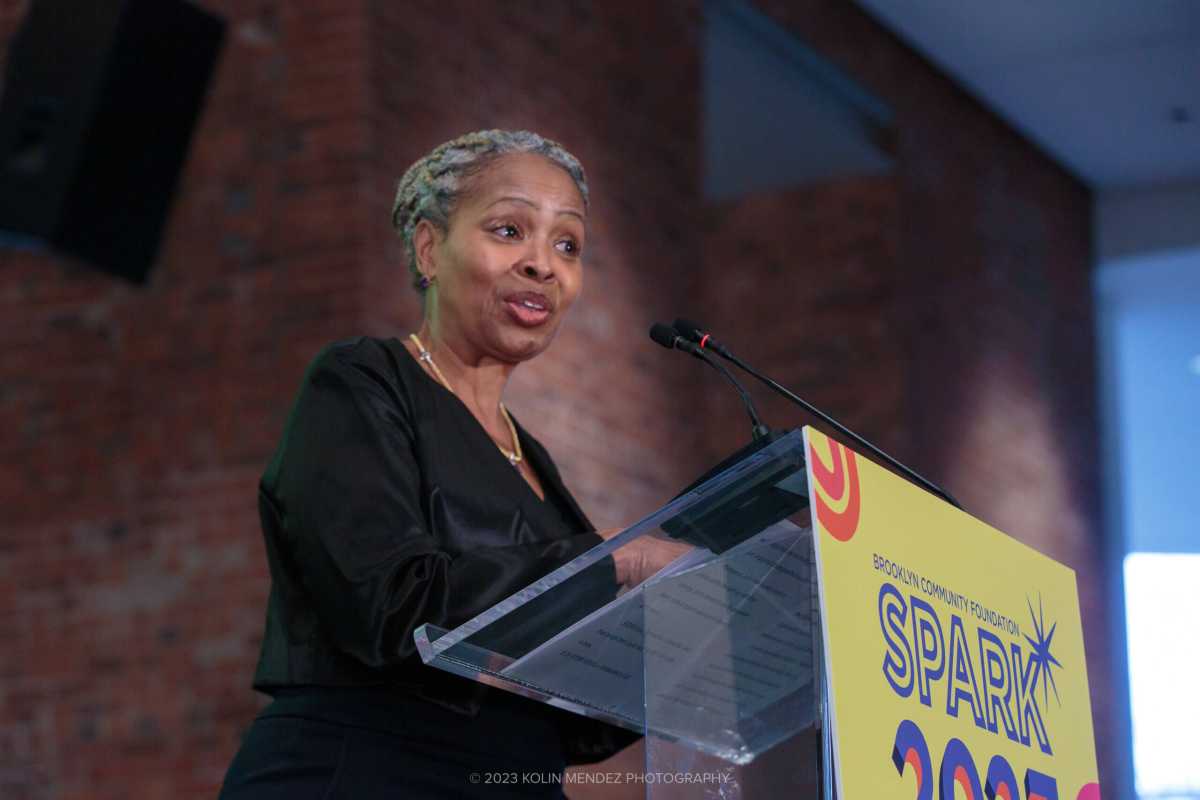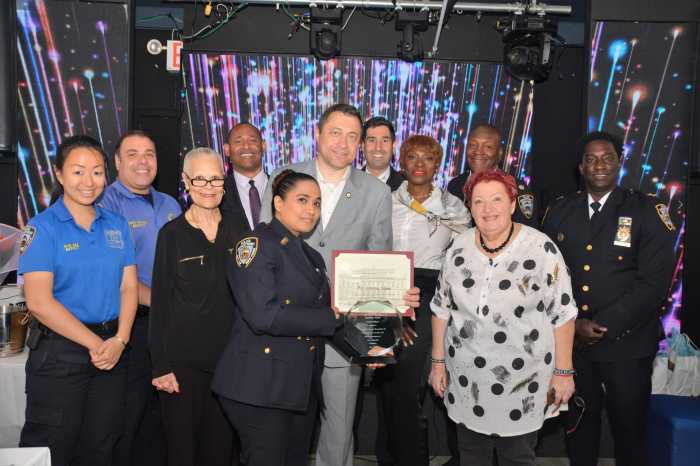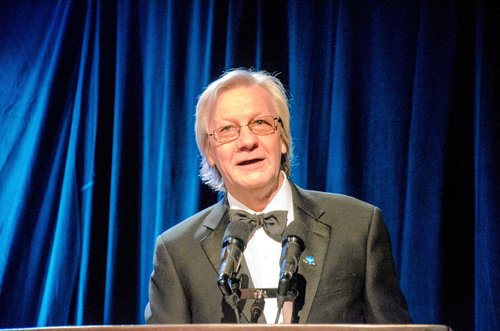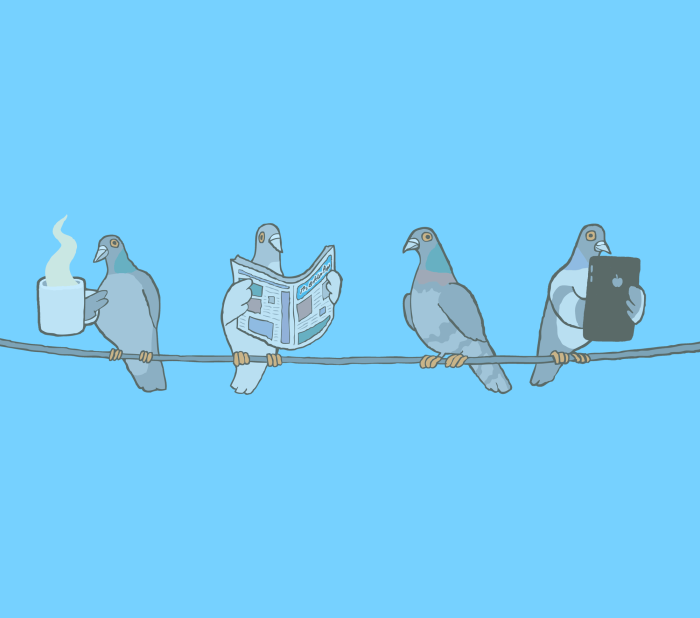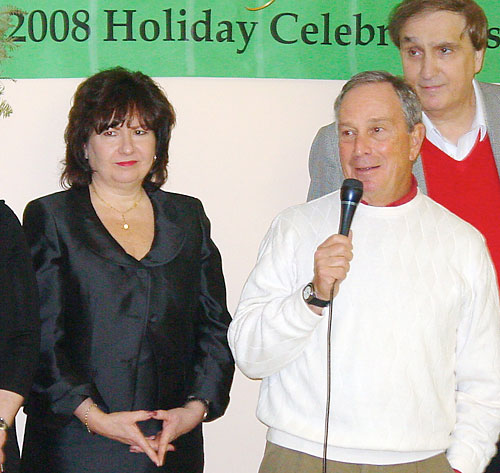The Brooklyn Community Foundation announced the winners of their annual Spark Prize, and has donated $100,000 each to five Brooklyn-based nonprofits to aid in their extraordinary work advancing important causes affecting millions of borough residents.
Gathered at the Brooklyn Museum on March 14, the organization honored this year’s winners with the no-strings-attached grant — marking the latest giveaway from the foundation that was established in 2016.
“Brooklyn is where change happens,” said Jocelynne Rainey, the President and CEO of the Brooklyn Community Foundation. “Brooklyn is also where change happens.”
“Nonprofits are the lifeblood of Brooklyn, and a lifeline of our neighborhoods. And that means a lot when you remember that Brooklyn is the center of the universe.”
This year, the foundation doled out grants to five nonprofit organizations: The Arab-American Family Support Center, the Kings Against Violence Initiative, the Mixteca Organization, STEM From Dance, and the Workers Justice Project.
Rainey noted the importance of the Spark Prize, which provides much-needed funding to the most deserving among the local nonprofit leaders, as the borough often lacks its fair-share of government-provided funding.
“Despite Brooklyn having thousands of nonprofits, only 7% of the funding for New York City nonprofits comes to Brooklyn-based organizations,” Rainey said. “That is precisely why we created the Spark Prize, and hold this event every year.”
“Brooklyn Community Foundation, and all of you, are creating a model for what can happen when we invest in our communities, and our local leaders,” she told the hundreds of attendees at their annual Spark Breakfast.
The event also honored Jennifer Jones Austin, who chairs the first-of-its-kind NYC Racial Justice Commission, for her work advocating for communities of color, and leading the charge to amend the city’s charter that aimed to “dismantle structural racism and embed racial justice and equity in all government functions.”
Since their founding, the Brooklyn Community Foundation has awarded $90 million in grants, and their effect on Kings County has been immeasurable.
“We are here to achieve our vision of creating a fair and just Brooklyn, where everyone who lives here can live their dreams, reach their fullest potential, and feel safe knowing that Brooklyn is, and always will be, home,” Rainey said.
Arab-American Family Support Center
Rawaa Nancy Albilal, the President and CEO of the Arab-American Family Support Center, accepted the grant on behalf of her organization, which has aided low-income immigrants and refugees in the Big Apple since 1994.
“I want to express our deepest gratitude for this honor. Thank you to the Brooklyn Community Foundation and the Spark Prize for this tremendous recognition,” Albilal said.
Since their inception, the organization has grown to provide a large swath of services to those who otherwise often fall through the cracks, and are often failed by traditional social services.
They now provide education services to adults and children, healthcare counseling, mental health support, youth enrichment programs, domestic violence support, and legal services often needed by immigrants.
Albilal was motivated largely by her own family’s experience, as they fled Lebanon during a time of civil war and political and economic turmoil.
“Growing up, I wish my family could have turned to an organization like the Arab-American Family Support Center,” she said.
Collectively, their staff speaks 36 languages, and they serve anyone in need.
“Everyone who enters our doors are welcome. Our doors are welcome to all,” she said. “We approach every interaction through a lens of safety, trustworthiness, peer support, as well as an appreciation for culture and history.”
One individual who benefited from their services, a refugee who fled Russia not long ago,
“I didn’t have a plan,” he said. “I lost my job as a TV journalist because state censorship did not like some of my programs. I received death threats after I tried to expose corruption in government agencies…Last year, my wife was arrested for peaceful protests against the war in Ukraine.”
When he came to America, his family was overwhelmed by the burden they now faced. But the Arab-American Family Support Center took them in, and provided the family with English lessons, guidance through the healthcare and education process, provided supplies for his school-aged children, and more.
When I walked into the offices of the Arab-American Family Support Center here in Brooklyn, we didn’t have much,” he said. “Look at us. Look at our family six months later.”
“I am very thankful to be here, and for the generous people of the Brooklyn Community Foundation — I believe that your support can spark this kind of positive change.”
Kings Against Violence Initiative
Ramik Willaims, the Co-Executive Director Kings Against Violence Initiative (KAVI), took the stage at the Brooklyn Museum to accept that organization’s grant, and spoke of how the funds from the Spark Prize would aid their mission of reducing violence in minority communities.
“We work to make sure that those born in Black and brown communities, or individuals born into homes of lower socioeconomic status, or not, are born into a safe community free from harshness that comes with injustice,” he said.
Founded in 2009, the organization uses social advocacy, mentorship programs and community mobilization in hospitals, schools, and community settings to not simply stop the scourge of violence plaguing too many communities — but address the root causes.
“KAVI exists because violence exists. Violence exists because there is anger, fear and mental or emotional pain — all of which are especially prevalent in Black and brown communities,” he said.”
“Violence is an expression of frustration. It is a symptom of larger issues,” Williams added. “We work to prevent and eliminate interpersonal violence from the lives of young people and promote education advocacy, leadership, community mobilization, and community equity.”
The organization now serves over 300 young people annually, and have helped countless individuals grow into well-educated, successful people that continue their productive impacts on society.
In addition, they help 750 patients through their hospital program each year, and have reduced hospital recidivism rates by over 75% percent — always making sure to follow up, and continue aiding wherever they can help.
“We do this work with a vision of a future where a generation of young people can grow up in an environment where at least there is a sense of a level playing field,” Williams said.
“We realize it takes an all-or-nothing approach. So we are all in.”
Mixteca Organization
Lorena Kourousias, the Executive Director of the Mixteca Organization, accepted their prize on Tuesday at the museum, and began with a personal story highlighting the organization’s aims.
“Not long ago I walked the halls of this museum. Not as a visitor, but as a nanny. As a housekeeper who was asked to clean the floors with a toothbrush,” she said. “Today I am here as executive director of Mixteca.”
Founded in 2000 in Sunset Park, the group began as a way to fill the gaps in the social safety net that were far-too prevalent in the local immigrant community.
“Our community needs love and empowerment, to conquer fear and misinformation,” Kourousias said. “We are a full service organization, working at the intersection of physical health, mental health, education and immigration.”
The organization helps immigrants and the Latinx community navigate through the many challenges they face — including in physical healthcare, mental health, education and legal issues.
When the political climate took a dark turn for the community in 2016, and anti-immigrant sentiments were on the rise, Mixteca rose the challenge — providing support and advocacy to defend the rights and wellbeing of the hispanic community in Brooklyn, and around the region.
“We work to remind them how powerful, how important and how valuable they are in our community,” Kourousias said.
Finishing with a heartwarming note, she spoke about the ways that their community has risen together, and continues to aid in each other’s well being.
“Our people don’t just want to receive, they want to give back,” she said, “Our work comes from understanding the power that we have.”
STEM From Dance
Women, and particularly women of color, are severely underrepresented in STEM fields in the United States.
That is why Yamilée Toussaint Beach launched STEM From Dance in 2012 — a nonprofit that offers services in concert with schools, after school programs, and a three-week summer program to bring women of color into STEM education in a comfortable and empowering environment.
“Why is it that less than 5% of STEM employees are women of color? There are more than 1 million STEM jobs to be created in the next 10 years — more than any other industry,” Beach said. “And these jobs pay more than other jobs. So why are women of color so significantly underrepresented, and not getting access to these industries?”
Girls who participate in STEM From Dance Programs are introduced to science, technology, engineering and manufacturing through dance.
“Our girls create dance routines that use technology in some way. That might be costumes that light up when they dance. Or choreographing and programming drones to dance alongside,” she said. “Our goal is to create a world where the STEM workforce is creative, is equitable, and inclusive — and where women of color are encouraged to bring their full creative, confident selves.”
Since 2012, the organization has mentored over 3,000 girls, and Beach sees the Spark Award as a way towards growing that even further.
“As we celebrate 10 years, our vision is to help 1 million Black and brown girls into STEM careers, and to invest $10 million annually into this mission,” she said.
While they are expanding to 10 cities as the organization continues to grow, Beach said that their Brooklyn roots were inseparable from the vision of the nonprofit.
“There was only one place for a creative and crazy idea to thrive: right here in Brooklyn. Brooklyn is fertile ground. A place for creativity, ambition and energy,” she said. “What started here in Brooklyn will someday impact the nation, and the world.”
The Workers Justice Project
The Workers Justice Project (WJP) is a far-reaching organization that operates on behalf of laborers to help organizing efforts and to empower workers that are often overlooked.
Founded in 2010, WJP aims to reduce the barriers faced by low-wage and immigrant workers, while offering Spanish-language services, training and organizing guidance.
Since its inception, WJP has created over 5,000 construction and house cleaning jobs, which have provided millions of dollars in salaries to those who have lacked only for a chance.
In addition, they have done significant advocacy work that led to six landmark policy changes in 2021 designed to aid 65,000 app-based delivery workers — including improved conditions, mandating that delivery workers be allowed to use restaurant bathrooms, set maximum travel distances, and set minimum payments per trip.
During the onset of the COVID-19 pandemic, when the plight of immigrant workers became as stark as ever, the WJP doled out $2.5 million in cash relief to essential workers that were often excluded from government-funded relief programs.
“The Spark Prize will allow Los Deliveristas to continue funding their own organizing efforts and determine how they want to build power in their communities,” said Ligia Guallpa, Executive Director of Workers Justice Project in a statement.
Donations to the Brooklyn Community Foundation can be made on their website.


